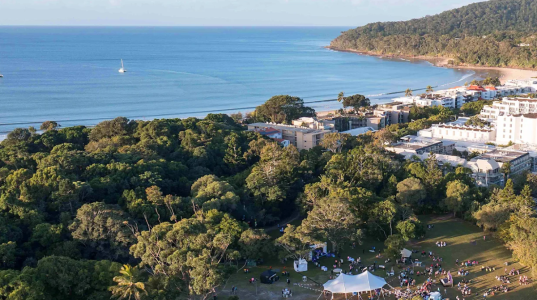Aussie council plan delivers $7,000 savings starting July
By
Gian T
- Replies 3
With the cost of living and housing prices soaring to record highs across Australia, it’s no wonder so many of us are feeling the pinch.
For many over 60s, the dream of downsizing, helping out family, or simply finding an affordable place to live has become more challenging than ever.
But there’s a glimmer of hope on the horizon—especially if you live in Noosa or are keeping an eye on what forward-thinking councils are doing to ease the pressure.
This week, Australia reached a sobering milestone: the median home price across the country has surpassed $1 million for the first time in its history.
Renters aren’t faring much better, with prices reaching record highs in many regions.
In response, councils are starting to think outside the box, introducing measures to help locals find affordable housing solutions.
One of the most promising moves comes from Noosa, where the council is set to scrap infrastructure charges for secondary dwellings—think granny flats, garden studios, or even a tiny home on wheels—starting 1 July.
This change could save homeowners a whopping $7,000 on average, making it much more affordable to build a secondary dwelling on your property.
Traditionally, councils charge infrastructure or developer fees when you add a new dwelling to your property.
These fees are intended to cover the additional strain on local services—roads, water, sewage, and community facilities—that result from increased population density in the area.
While the logic makes sense, the reality is that these charges can be a significant barrier for everyday Aussies looking to create more housing options for themselves or their loved ones.
Noosa’s decision to waive these fees is a game-changer.
According to Richard MacGillivray, the council’s director of development and regulation, this move is designed to encourage more landowners to build and rent out granny flats, especially for singles, couples, and older residents who are struggling to find affordable, long-term accommodation.
The new policy is clear: secondary dwellings must be used for permanent accommodation, not short-term holiday rentals.
This ensures that the benefits go to those who need a stable home, not just investors looking to cash in on the Airbnb boom.
Noosa Mayor Frank Wilkie is optimistic about the impact.
'We hope by removing the infrastructure charges, which are typically several thousand dollars per application, we will see more people build them and offer them for rent,' he said.
The council is also waiving development application fees for not-for-profit housing providers and, in some cases, private developers who commit to long-term affordable rentals.
Noosa isn’t alone in rethinking housing rules. Across Australia, other states are making it easier to build granny flats:
In Victoria, since December 2023, homeowners can build a second dwelling up to 60 square metres without a planning permit if the land is over 300 square metres and not affected by flood or environmental overlays.
In Western Australia, from April 2024, granny flats are permitted on any residential lot without planning approval, as long as they meet local setback rules and stay within the 70 square metre size limit.
But while these changes are positive, Noosa’s move to scrap infrastructure charges entirely is still rare—and could set a precedent for other councils to follow.
For many over 60s, granny flats offer a flexible, affordable way to stay close to family, downsize without leaving the neighbourhood, or generate extra income by renting out a small unit.
They’re also a lifeline for adult children, key workers, and older residents who are being priced out of the traditional rental market.
And let’s not forget: a well-designed granny flat can add value to your property, provide independence for loved ones, and even help you age in place with dignity and comfort.
Noosa’s new incentives are part of a broader strategy to tackle the housing crisis, including planning scheme amendments to boost the supply of smaller, affordable homes for key workers, older residents, and small households.
These changes are awaiting ministerial approval, but the financial incentives kick in on 1 July 2025.
If you’re a Noosa landowner, now’s the time to start planning.
And if you live elsewhere, keep an eye on your local council—Noosa’s bold move could inspire similar changes across the country.
 Are you considering building a granny flat or tiny home for yourself, a family member, or as a rental? Do you think your local council should follow Noosa’s lead and scrap infrastructure charges? Share your thoughts, experiences, and questions in the comments below.
Are you considering building a granny flat or tiny home for yourself, a family member, or as a rental? Do you think your local council should follow Noosa’s lead and scrap infrastructure charges? Share your thoughts, experiences, and questions in the comments below.
Read more: Council rules spoil camping plans as local landowners slam new restrictions
For many over 60s, the dream of downsizing, helping out family, or simply finding an affordable place to live has become more challenging than ever.
But there’s a glimmer of hope on the horizon—especially if you live in Noosa or are keeping an eye on what forward-thinking councils are doing to ease the pressure.
This week, Australia reached a sobering milestone: the median home price across the country has surpassed $1 million for the first time in its history.
Renters aren’t faring much better, with prices reaching record highs in many regions.
In response, councils are starting to think outside the box, introducing measures to help locals find affordable housing solutions.
One of the most promising moves comes from Noosa, where the council is set to scrap infrastructure charges for secondary dwellings—think granny flats, garden studios, or even a tiny home on wheels—starting 1 July.
This change could save homeowners a whopping $7,000 on average, making it much more affordable to build a secondary dwelling on your property.
Traditionally, councils charge infrastructure or developer fees when you add a new dwelling to your property.
These fees are intended to cover the additional strain on local services—roads, water, sewage, and community facilities—that result from increased population density in the area.
While the logic makes sense, the reality is that these charges can be a significant barrier for everyday Aussies looking to create more housing options for themselves or their loved ones.
Noosa’s decision to waive these fees is a game-changer.
According to Richard MacGillivray, the council’s director of development and regulation, this move is designed to encourage more landowners to build and rent out granny flats, especially for singles, couples, and older residents who are struggling to find affordable, long-term accommodation.
The new policy is clear: secondary dwellings must be used for permanent accommodation, not short-term holiday rentals.
This ensures that the benefits go to those who need a stable home, not just investors looking to cash in on the Airbnb boom.
Noosa Mayor Frank Wilkie is optimistic about the impact.
'We hope by removing the infrastructure charges, which are typically several thousand dollars per application, we will see more people build them and offer them for rent,' he said.
The council is also waiving development application fees for not-for-profit housing providers and, in some cases, private developers who commit to long-term affordable rentals.
Noosa isn’t alone in rethinking housing rules. Across Australia, other states are making it easier to build granny flats:
In Victoria, since December 2023, homeowners can build a second dwelling up to 60 square metres without a planning permit if the land is over 300 square metres and not affected by flood or environmental overlays.
In Western Australia, from April 2024, granny flats are permitted on any residential lot without planning approval, as long as they meet local setback rules and stay within the 70 square metre size limit.
But while these changes are positive, Noosa’s move to scrap infrastructure charges entirely is still rare—and could set a precedent for other councils to follow.
For many over 60s, granny flats offer a flexible, affordable way to stay close to family, downsize without leaving the neighbourhood, or generate extra income by renting out a small unit.
And let’s not forget: a well-designed granny flat can add value to your property, provide independence for loved ones, and even help you age in place with dignity and comfort.
Noosa’s new incentives are part of a broader strategy to tackle the housing crisis, including planning scheme amendments to boost the supply of smaller, affordable homes for key workers, older residents, and small households.
These changes are awaiting ministerial approval, but the financial incentives kick in on 1 July 2025.
If you’re a Noosa landowner, now’s the time to start planning.
And if you live elsewhere, keep an eye on your local council—Noosa’s bold move could inspire similar changes across the country.
Key Takeaways
- From July 1, Noosa landowners can build secondary dwellings like granny flats without paying infrastructure charges, saving applicants around $7,000 on average.
- The council hopes removing these fees will encourage more residents to build and rent out granny flats as permanent, affordable housing—not as short-term rentals.
- Development application fees will also be waived for not-for-profit housing providers and private developers who commit to long-term affordable rentals, aiming to boost the supply of accessible homes.
- Other states, including Victoria and Western Australia, have introduced similar measures to make small secondary dwellings easier to build, with Noosa’s changes forming part of a broader national shift towards tackling the housing crisis.
Read more: Council rules spoil camping plans as local landowners slam new restrictions








